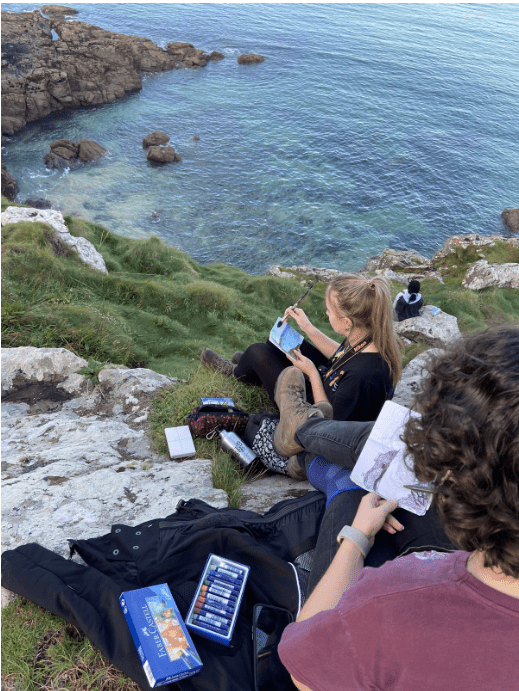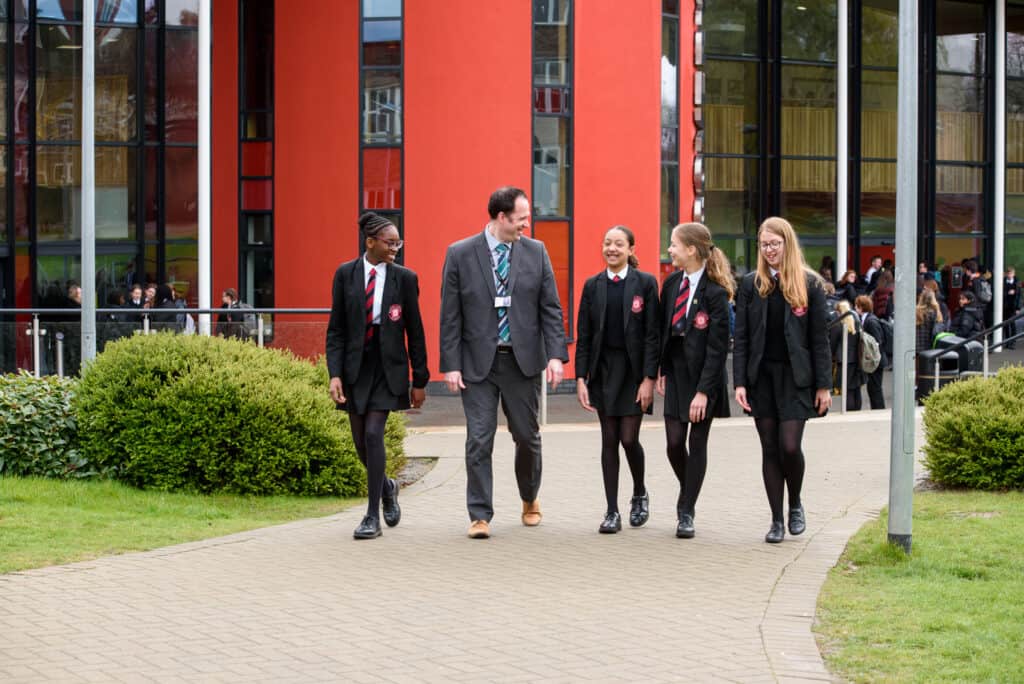Our values and virtues
Latin Learning is the basis of the school’s teaching and learning philosophy. We take seriously our obligations to ensure that students are given both the academic and personal skills needed to lead a happy life beyond school. This means not just developing good working habits and aspiring to great achievements, but also learning how to care for their own and others’ wellbeing, and recognise how their greatest achievements may not be those which are publicly recognised.
The acronym ‘LATIN’ was created in consultation with teachers and students, and stands for the values:
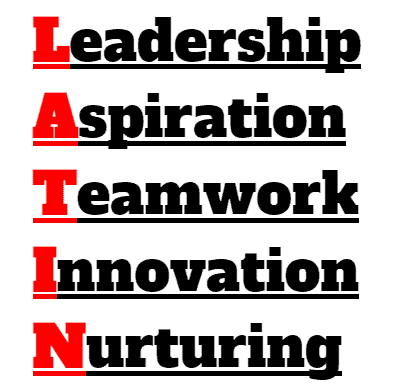
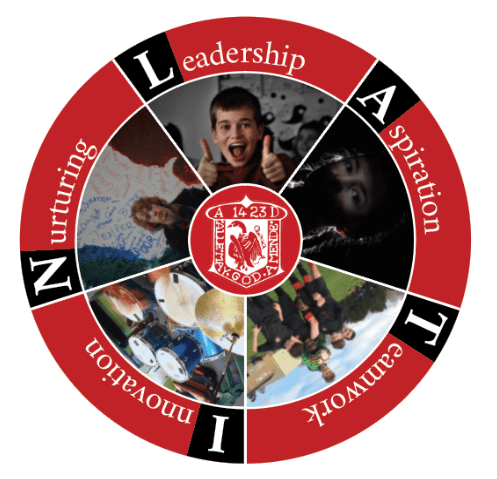
These words are designed to remind students, parents, and teachers alike that our education is not just about academic knowledge, but should develop a moral compass and sense of enrichment and enjoyment in learning. It focuses on developing real-world life skills that will enable students to thrive not just in the sheltered environment of school, but in work and university.
In reviewing our Latin Values after the Pandemic, we developed the idea that certain Virtues link to each value to remind us that without virtues, values lose their power. For the coming school year, therefore, we are seeking to “grow the Latin Virtues” to link to our existing values. In this way, we are trying to highlight:
INTEGRITY for Leadership
RESILIENCE for Aspiration
RESPECT for Teamwork
COURAGE for Innovation
COMPASSION for Nurturing
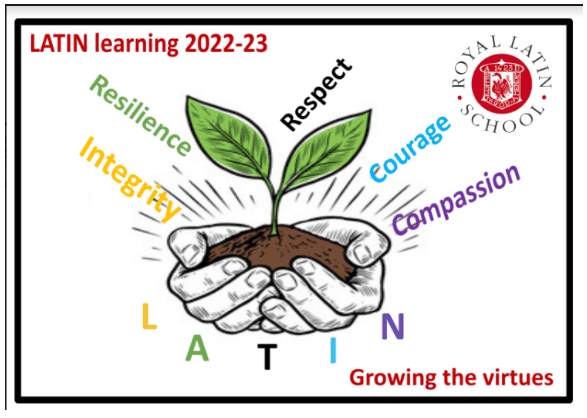
The school development plan focuses around Latin Learning, as do individual department plans. Staff targets for professional development link to each area, and we strive to ensure balance between different areas so as to provide our students with a balanced experience of school. The student council now has five subcommittees, linked to the five qualities, which ensures that students also have input into our plans. Further details of how we try to develop each quality may be found on the appropriate page.
LEADERSHIP with integrity
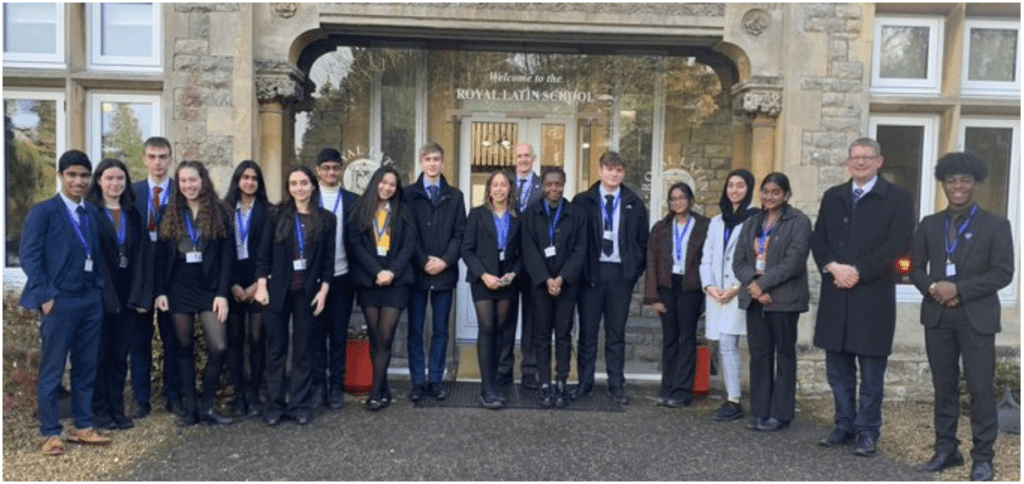
Leadership is a strength in our school, and developing student leadership is one of our key priorities. We want to help students understand the complexities of true leadership: that it is not always about winning public recognition, but can be a much quieter thing.
INTEGRITY is a key quality for leadership, and we seek to develop strong moral principles in our students by highlighting the responsibilities that come with leadership, and discussing issues of integrity when it comes to their own work; taking responsibility and owning up to mistakes, and holding true to your deepest values despite peer pressure.
Students in school have many opportunities to develop their leadership skills. Each form group provides five representatives for the student council, who each contribute to one of its five subcommittees. This means learning about how to negotiate and discuss with others concerning things about which you may feel very passionately: taking on others’ points of view.
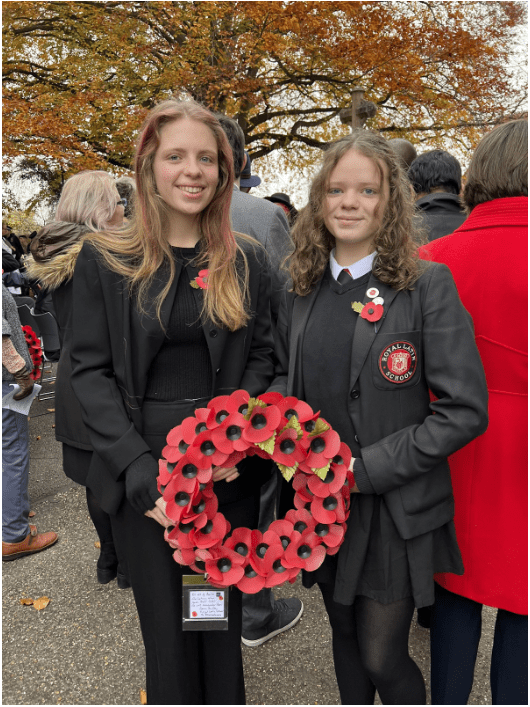
Student Leadership demonstrated by a Latin Student (member of the UK Youth Parliament for Milton Keynes South) speaking in the House of Commons – click here
As students move through the school, leadership opportunities expand. For example, older students can become peer mentors or subject mentors to those in younger years. We have a well-established prefect system and an active Student Leadership Team that as well as the traditional roles of Head Boy and Head Girl includes Senior Prefects, House Captains, Year Captains, Subject Captains, Wellbeing Ambassadors, and LGBTQ+ Ambassadors. In the Royal Latin, students take assemblies, support their peers, help to influence the policy and curriculum of the school, represent the school in the outside world, and have even presented to staff to support staff training about issues of equality and diversity. We are proud of our Latin Leaders, and always looking for new ways in which to develop them.
ASPIRATION with resilience
Aspiration in the Royal Latin means many things. It can often mean high academic achievement–one thing for which the school is famous–and as such we foster our students’ ambitions for the future, working with them when they wish to apply for the top selective universities, the most competitive apprenticeships, or the most challenging courses, such as medicine or Veterinary Science. Students are coached and supported for interviews and assisted through the complex UCAS experience, as well as through the application processes for Oxford and Cambridge.
However, the idea of Aspiration also includes in it our desire to make a better world, and to represent the best of ourselves, moving forward and embracing new ideas and fostering equality so that we can be fully inclusive throughout school. It means that we aspire to be the best that we can, and this can mean re-thinking old ways of working and challenging ourselves and others.
RESILIENCE is the virtue that we link especially to aspiration, because if you aspire highly you will inevitably have to cope with the experience of failing to achieve all that you want, at least to start with. We try to encourage our students to think of their aspirations in the context of a growth mindset, that sees any failure as an opportunity to learn. We encourage them to think that to ‘fail better’, to persist and not to lose heart is the way to success.

Aspiration means that we aim for the best in every area. Our constantly changing careers programme ensures that all students in school are supported appropriately to think through their future, and work out what route would be best for them.
To that end, we frequently have visitors from the world of work who either come into school or invite our students to their workplaces so as to give them ‘hands-on’ experience of different disciplines, and inspire them to try something different. With the recent launch of our new sports campus, we have been fortunate enough to have visits from several Olympians, who have enthused and encouraged our young people to greater challenges in the world of sport.
TEAMWORK with respect
Teamwork is key at the Royal Latin, and sits in the centre of our ‘LATIN’ principles. It means that we place a high importance on student voice, and we follow through on what our students and parents tell us needs to improve in school. Teamwork means that the school works as a unit, realising that it is only through a community working together that you can implement meaningful change. Our strong sporting culture helps to support the idea of working together.
RESPECT is the virtue which we link to teamwork. If we do not respect others, we will not make the best of every member of our school community, and our teamwork will be weaker as a result. Students are taught both explicitly and by example to respect others and to value diversity and equality in and out of school.
Working together, we know that we can achieve more. For example, the school’s ‘Green Touch’ group is an environmental group run by students which has had a real impact on school policy. Among other activities, students promote recycling, go into assemblies, plant trees, and make policy suggestions. Students have an impact on our curriculum, and student voice has been important in helping us look at issues of diversity and inclusion in our curriculum.
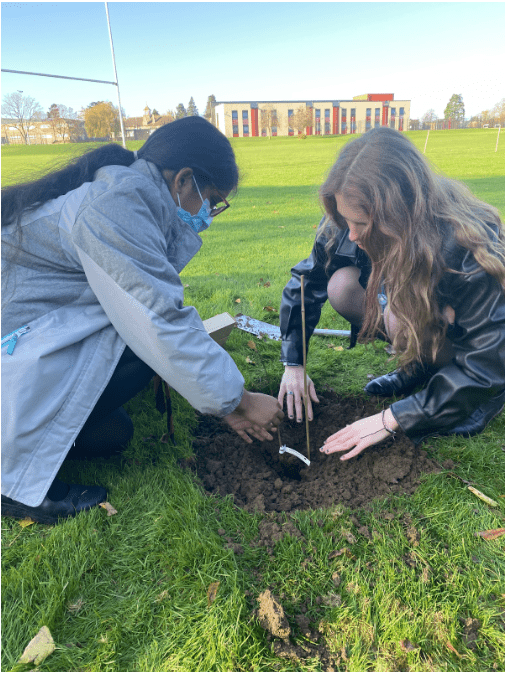
Teamwork is about how we can make the school a better place in which to live and work for both students and staff. It’s about building ideas through collaboration and making connections with others in and outside school as well. Staff are given dedicated INSET time in which to read and research independently. They are also encouraged to go out to visit other schools so as to learn from different teams and see other ways of working, bringing the best ideas back to the Royal Latin.
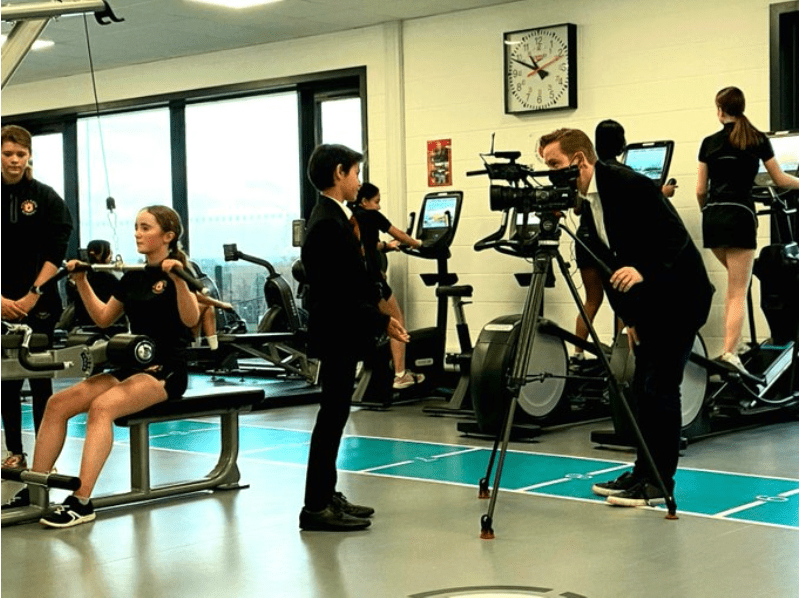
INNOVATION with courage
We try to be innovative in teaching and learning, so students are introduced to new ways of learning through a range of experiences, including trips and visits to see the best of the outside world. In school, our introduction of chromebooks throughout the school has been of great benefit to student-teacher communication in terms of learning, especially during lockdown. All year groups now have access to a device in school and teachers are increasingly sharing good practice about innovative teaching methods that use these.

COURAGE is the virtue which we connect with innovation, as it often requires courage to try new things and to go out of our comfort zone. We try to encourage students to take risks in their learning, to challenge themselves, and to try out things that they may have never considered before in the safe context that school provides. We also emphasise how courage is needed to practise all the virtues, and to stand up for your moral principles.
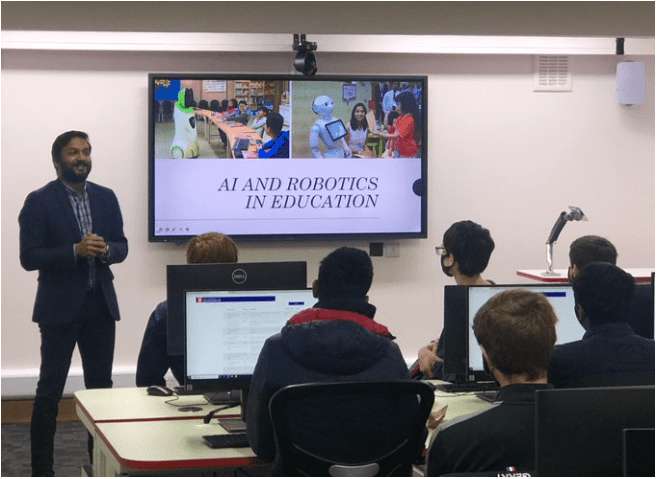
A key part of innovation for us includes the desire to use new ideas and new technology so as to bring about a better and fairer world. As a result, groups in school are working to combat climate change, and as part of this work one of our students was chosen as the Buckinghamshire schools representative for the COP26 summit in 2021. This kind of role-modelling we see as the best in both leadership and aspiration for our students.
Innovation also connects to our hopes for the future, fuelling the energy to fund new buildings such as the Discovery Centre and the Sports Campus or our dreams of an Arts Centre. We are really conscious of the school’s great history and how it has always changed and adapted from its first small beginnings to its current form. Innovation means that we don’t lose sight of where we came from, but that we focus on what is to come in the future. Where will we be in another 600 years?
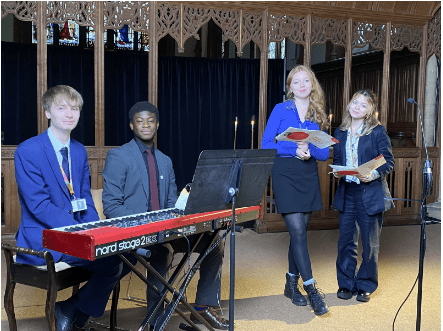
NURTURING with compassion
Wellbeing for students has never been a more important issue, and we seek to teach our students how to care for others, and look after their own mental health. We are very aware of the different stresses on students, especially in the wake of the pandemic, and encourage them to learn how to seek help when they are troubled, so as to build healthy patterns in adulthood. We also encourage our staff to model how to look after their own wellbeing, and encourage healthy dialogues about mental health, and how physical activity can promote mental health.
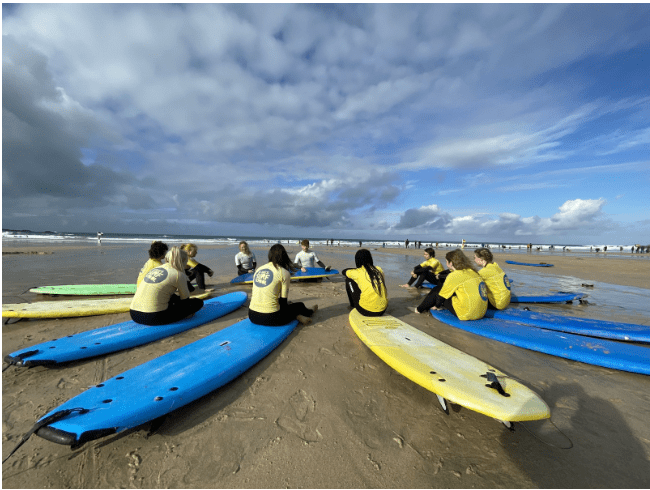
COMPASSION is the virtue which connects to Nurturing for us, and we actively seek to support students to develop their awareness of others’ feelings and experiences, growing empathy and understanding through charitable work, and through the way in which they interact with others in school. Our PSHE programme focuses on how to build healthy relationships, and foster respect for others at all times.
We have a team of five school counsellors who are available for students, and students can be referred by contacting any member of staff. We also have drop-in sessions for students who wish for immediate support or who are simply looking for advice. Our strong pastoral team are trained to a high level in safeguarding and keep an active eye out for students who may be feeling sad or lonely, encouraging them to join in some of our many activities at break and lunchtimes.
We have introduced Mental Health ambassadors in the sixth form, who complement our team of trained peer listeners. These students are carefully selected, trained in safeguarding, and supported by our lead school counsellor so as to help them become a point of access and support for younger students. In the sixth form, we have trained peer listeners, who work with a tutor group and are trained in safeguarding and listening as part of their role. We also have subject captains, who lead in subject areas and help teachers organise open evenings, promote their subject, and coach younger students.
